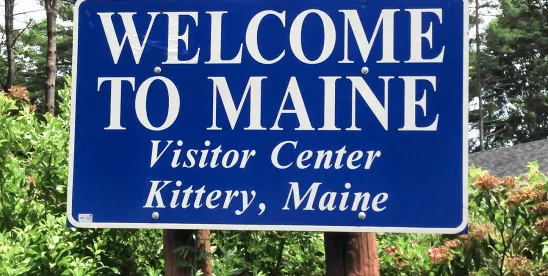Employers across the nation, especially those in the healthcare industry, continue to grapple with ever-changing and complex state and federal legislation regarding COVID-19 vaccinations.1 On 19 October 2021, the U.S. Court of Appeals for the First Circuit provided some clarity to Maine’s healthcare employers when it declined to block the state’s emergency rule requiring all healthcare workers to be vaccinated, despite the rule’s lack of a religious exemption (the Maine healthcare mandate).2 On 29 October 2021, the U.S. Supreme Court rejected an emergency appeal of the First Circuit’s ruling, and the Maine healthcare mandate went into effect. However, on 4 November 2021, the Centers for Medicare & Medicaid Services (CMS) introduced an interim final rule that requires all eligible healthcare employees at covered healthcare facilities to obtain a COVID-19 vaccination. In contrast with the Maine healthcare mandate, the CMS interim final rule does allow for religious exemptions. Because the CMS interim rule preempts any state or local law that contradicts or prevents the implementation of the interim rule, the Maine Department of Health and Human Services (Maine HHS) announced that it is reviewing the federal rule and will provide guidance on its impact on the Maine healthcare mandate.
THE LAWSUIT—DOES V. MILLS, ET AL.
On 12 August 2021, Maine’s Center for Disease Control and Prevention (Maine CDC) and Maine HHS issued an emergency rule requiring all on-site healthcare workers to be vaccinated against COVID-19, unless they qualify for a medical exemption.3 Under the rule, covered workers had to be vaccinated against COVID-19 by 29 October 2021, or face termination.4 On 25 August 2021, a group of unvaccinated healthcare employees asked the U.S. District Court for the District of Maine to stop the Maine healthcare mandate from taking effect. The group argued that the mandate violates their constitutional rights because it lacks a religious exemption. On 13 October 2021, a Maine federal judge rejected the group’s arguments.
The group appealed the court’s order to the First Circuit. On appeal, appellants argued that the Maine healthcare mandate violates their constitutional rights under the Free Exercise Clause and Equal Protection Clause,5 as well as under the Supremacy Clause, Title VII of the Civil Rights Act of 1964 (Title VII), and 42 U.S.C. § 1985,6 because it contains a medical exemption but not a religious exemption. Appellants claimed that their sincerely held religious beliefs prevent them from being vaccinated with any of the FDA-approved vaccines.
The First Circuit affirmed the lower court’s denial of a stay, finding that appellants were unlikely to succeed on the merits. It rejected their Free Exercise claims on three primary bases.
First, the court found that the Maine healthcare mandate is religiously neutral because it does not allow religious exemptions or exemptions based on philosophical beliefs. Therefore, the Maine healthcare mandate does not single out religious objections to the vaccination because of their religious nature.
Second, the court concluded that the Maine healthcare mandate is generally applicable because it applies equally to all religious and philosophical beliefs and does not require the government to exercise discretion in evaluating religious or philosophical exemption requests. The court also found that the medical exemption, unlike the religious exemption, furthers Maine’s articulated interests in: (1) ensuring that healthcare workers remain healthy and able to provide the needed care to an overburdened healthcare system, (2) protecting the health of those in the state most vulnerable to the virus (including those who cannot be vaccinated for medical reasons), and (3) protecting all Mainers’ health and safety.
Third, the court found that the Maine healthcare mandate is rationally related to and achieves the legitimate government interest of protecting public health against a deadly virus, and that it is narrowly tailored to achieve that compelling interest. In reaching these conclusions, the court highlighted Maine’s prior attempts to reduce the spread of COVID-19 (e.g., incentivizing vaccination, worksite vaccine administration, rapid testing, masking, and social distancing), which did not achieve the 90% vaccination rate the Maine CDC said was necessary to prevent community transmission of the virus.
The court also rejected appellants’ request for an injunction under Title VII for two primary reasons. First, the court found that appellants could not establish that they had inadequate remedies at law because any injury from employment termination could be remedied by money damages. Second, the court concluded that appellants failed to prove a likelihood of success on the merits because providing a religious exemption to the Maine healthcare mandate could cause the hospitals to suffer undue hardship, including the risk of spreading COVID-19 in the workplace.7
Finally, for all of appellants’ claims, the court found that appellants failed to prove entitlement to a preliminary injunction because, among other things, the balancing of equities weighed in favor of Maine’s “interest in safeguarding its residents” and issuing an injunction would not serve the public interest.
A day after the First Circuit’s ruling, appellants filed an emergency application for review with the Supreme Court.8 In their petition, appellants asked the Supreme Court to enjoin the Maine healthcare mandate from taking effect pending their filing of a petition for writ of certiorari. On 29 October 2021, the Supreme Court denied appellants’ application in a 6-3 decision. Justice Neil Gorsuch wrote a dissenting opinion, which Justices Clarence Thomas and Samuel Alito joined.9 Justice Gorsuch found that the law is neither neutral nor generally applicable, as it treats a comparable secular activity more favorably than the exercise of religion, the law is not the least restrictive means to achieve its interests, and appellants had shown irreparable harm because of the loss of their First Amendment freedom.
This is the third time the Supreme Court declined to block a COVID-19 vaccination mandate,10 but it is the first time the court addressed a COVID-19 vaccination mandate that lacks a religious exemption. While it is the first time the court has addressed this specific issue, it will not be the last. Indeed, an emergency application to block the New York state healthcare worker vaccination mandate, which also lacks a religious exemption, is currently pending before Justice Sonia Sotomayor.11
WHAT ABOUT PREEMPTION?
Although the Maine healthcare mandate escaped Supreme Court review (for now), the mandate’s lack of religious exemption may place it at risk of preemption. On 4 November 2021, CMS introduced an interim final rule that requires all eligible healthcare employees at covered healthcare facilities to be fully vaccinated against COVID-19 by 4 January 2022.12 CMS’s interim final rule recognizes exemptions for medical conditions or disabilities and sincerely held religious beliefs. CMS’s interim rule preempts any state or local law that contradicts or prevents the implementation of the interim rule by providing broader exemptions than federal law or being inconsistent with the federal rule. The Maine HHS is assessing CMS’s rule and will provide guidance on whether healthcare employers subject to both the Maine healthcare mandate and CMS rule must offer a religious exemption.13
WHAT DOES THIS MEAN?
Despite the uncertainty of pending litigation and unsettled preemption issues, healthcare employers subject to the Maine healthcare mandate (and other employers subject to vaccination mandates currently being challenged in court) should consider taking the following steps so they are prepared to implement vaccination mandates and respond to employee concerns as soon as decisions on mandate enforceability are made:
-
Plan to implement clear, unambiguous, and uniform policies to protect the health and safety of the workplace while adhering to state and federal guidance;
-
Prepare transparent and consistent guidelines for reviewing and processing accommodations and exemptions;
-
Develop a confidential system to begin confirming and documenting employees’ vaccination status;
-
Inform employees about any new developments in COVID-19 safety measures and what is expected of them to continue working; and
-
Educate employees about vaccination.
FOOTNOTES
1 For a discussion on the multiple vaccination mandates, see Craig Leen, et al., How Health Care Cos. Can Untangle Web of Vaccine Mandates, LAW 360 (Oct. 13, 2021).
2 The case is Does v. Mills, No. 21-1826 (1st Cir. Oct. 19, 2021).
3 Maine has long-required healthcare workers to be vaccinated against various contagious diseases. See 1989 Me. Laws ch. 487, § 11. In 2020 (before the pandemic), the state removed religious and philosophical exemptions from the law in response to decreased vaccination rates and fear for the safety of Maine’s most vulnerable citizens. See Does v. Mills, No. 21-1826, at *4 (1st Cir. Oct. 19, 2021).
4 Maine CDC considered numerous other strategies for stemming the COVID-19 virus before issuing the emergency rule, including (1) weekly or twice weekly testing; (2) daily testing; (3) vaccination exemptions for individuals previously infected with COVID-19; and (4) reliance on personal protective equipment. However, the Maine CDC found that these measures did not fully protect the state’s healthcare infrastructure and the community against COVID-19.
5 The Free Exercise Clause protects an individual’s religious liberty against government interference. U.S. CONST. amend. I. The Equal Protection Clause prohibits the government from denying individuals equal treatment under the laws. U.S. CONST. amend. XIV, § 1.
6 The Supremacy Clause restricts states from conflicting with federal law, Title VII prohibits employment discrimination on the basis of race, color, religion, sex, and national origin, and 42 U.S.C. § 1985 protects against conspiracy where two or more individuals conspire to interfere with another’s civil rights. See U.S. CONST. art. VI, cl. 2; 42 U.S.C.A. § 2000e-2 (West); 42 U.S.C.A. § 1985 (West).
7 The court also rejected appellants’ claims under the Equal Protection Clause and § 1985, finding that the Equal Protection claim failed for the same reasons as the Free Exercise claim, and the § 1985 conspiracy claim failed because appellants did not establish that the hospitals worked in agreement with the government to amend or issue the Maine healthcare mandate.
8 Emergency Application for Writ of Injunction Pending Disposition of Petition for Writ of Certiorari Relief Requested By October 26, 2021, Does v. Mills, No. 21A90 (Oct. 20, 2021). Appellants filed their first emergency request for review before the First Circuit ruled, and Justice Breyer denied that request without prejudice to give the First Circuit time to rule.
9 Does, No. 21A90, at *1 (Oct. 29, 2021) (Gorsuch, J., dissenting).
10 On 12 August 2021, Justice Amy Coney Barrett declined a group of Indiana University students’ request to block a student vaccination mandate. See Klaassen v. Trs. of Indiana Univ., No. 21-2326 (7th Cir. Aug. 2, 2021). On 1 October 2021, Justice Sonia Sotomayor declined a group of teachers’ request to block New York City’s vaccination mandate for public school teachers. Following Sotomayor’s decision, the Second Circuit denied the plaintiff’s motion for a preliminary injunction in a one-page opinion. See Maniscalco v. N.Y. City Dep’t of Educ., No. 21-2343 (2d Cir. Oct. 15, 2021).
11 Emergency Application for Writ of Injunction, We The Patriots USA, Inc. v. Hochul, No. 21A125 (Nov. 2, 2021).
12 Medicare and Medicaid Programs; Omnibus COVID-19 Health Care Staff Vaccination, 86 Fed. Reg. 61,555, 61,568 (Nov. 5, 2021) (CMS Rule). For more information on the CMS interim final rule, see Sarah L. Carlins, et al., Vaccine Mandate: The Rule is Out and The Details are Here as CMS Requires COVID-19 Vaccinations for Staff of Most Medicare and Medicaid-Certified Providers and Suppliers.
13 Health Care Worker Vaccination FAQs, STATE OF MAINE COVID-19 RESPONSE.





 />i
/>i

